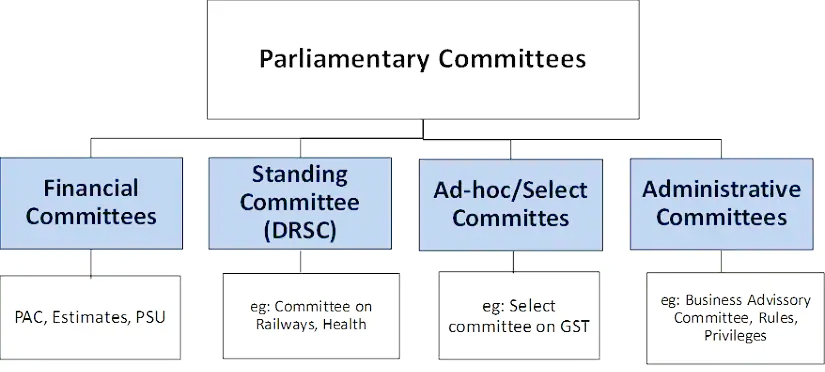[ad_1]

Context:
In the light of the horrendous experience of the Government over the farm laws, the present practice of not referring the Bills to committees should be reviewed.
Lok Sabha Speaker has spoken about strengthening the committee system in the recent presiding officers’ conference. One way of strengthening it is by getting all the important Bills examined by them.
The farmers had to wage a prolonged struggle because the systems of Parliament were bypassed by the Government.
A government elected by the people can function only in a democratic way. Other options are not available to it.
The farmers who sat at the Delhi border for 14 months, braving heat and cold and death and conducting themselves in the most democratic way, have once again proved that.
A missed step of referred bills to the committees:
In fact, available data shows that Bills are very rarely referred to the committees these days.
House rules have vested the discretion in the presiding officers in the matter of referring the Bills to committees.
No reasoned decisions of the presiding officers for not referring them are available. Since detailed examination of Bills by committees result in better laws, the presiding officers may, in public interest, refer all Bills to the committees with few exceptions.
Although the relevant rule is not happily worded, the intent is clear, namely, that the committee should examine all the important Bills.
Importance of Parliamentary committees in democracy:
The Parliamentary committees are established to study and deal with various matters that cannot be directly handled by the legislature due to their volume.
- These committees act as a mini-parliament, as they have MPs representing different parties are elected into them through a system of the single transferable vote, in roughly the same proportion as their strength in Parliament.
- They monitor the functioning of the executive branch and provide legislature with various policy input, playing an important role in Indian democracy.
- It scrutinises the accounts and the report of the Comptroller and Auditor-General of India, thereby ensuring accountability of any misspending.
- Parliamentary committees ensure executive accountability through scrutiny of public spending and various laws.
- The Public Accounts Committee is concerned with the manner and results of spending public funds.
- Although committee recommendations are not binding on the government, their reports create a public record of the consultations that took place and put pressure on the government to reconsider its stand on debatable provisions.
- By virtue of being closed-door and away from the public eye, discussions in committee meetings are also more collaborative, with MPs feeling less pressured to posture for media galleries.
Decreasing role of Parliamentary committees:
- In a parliamentary democracy, the bills of such significance are sent to parliamentary committees for closer scrutiny.
- However, 71% of the bills went to parliamentary committees between 2009 and 2014, and this dipped to only 25% between 2014 and 2019.
- Side-lining parliamentary committees is increasingly becoming the norm in India. But, given the significance of the parliamentary committee system in democracy, it needs to be strengthened rather than rendered defunct.
- Protection of farmers is an essential part of national interest. So, in any future legislation on farmers it is absolutely necessary to involve the systems of Parliament fully so that a balanced approach emerges.
- We must not forget that the farm Bills were not referred to either the standing committee or a joint select committee of both Houses of Parliament as has been the practice earlier.
- Other issues affecting the functioning of the committees are low attendance of MPs at meetings, too many ministries under a committee.
- Norms not followed by most political parties while nominating MPs to committees and the constitution of DRSCs for a year leaves very little time for specialisations.
Steps that need to take:
- These farm Bills should have been referred to the standing committee on agriculture for a detailed scrutiny. The committee could have held comprehensive discussions with the farmers.
- They would have thus got an opportunity to present their views before the committee and Parliament.
- In fact, their main complaint was that they were not consulted at any stage before the ordinances were issued.
- Radical changes in the farm sector without having any kind of consultation with the farmers was nothing short of adventurous.
- It is very surprising why important Bills which are coming before Parliament are not being referred to the committees.
- The experience of centuries shows that scrutiny of Bills by the committees make better laws. The case of the farm laws holds an important lesson for this Government or any government.
- According to the National Commission to Review the Working of the Constitution (NCRWC), DRSCs should be periodically reviewed so that the committees which have outlived their utility can be replaced with new ones. For example:
- Standing Committee on National Economy to provide analysis of the national economy with resources for advisory expertise, data gathering, and research facilities.
- Standing Constitution Committee to scrutinize Constitutional Amendment Bills before they are introduced in Parliament.
Conclusion:
The prolonged non-violent agitation by the determined farmers and the final capitulation by a very powerful Government augur well for India’s democracy.
Although parliamentary and cabinet committees are not a part of the Constitution they ensure healthy democracy and governance through scrutiny and better policies. They enable the cabinet and Parliament to take difficult decisions.
A proper parliamentary scrutiny of pieces of legislation is the best guarantee that sectoral interest will not jeopardise basic national interest.
[ad_2]

